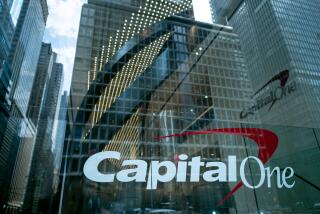American Express to Sell Boston Co. to Mellon : Finance: The beleaguered credit card company is seeking to raise capital.
- Share via
BOSTON — American Express Co., seeking to boost capital as it recovers from a series of setbacks, is selling its Boston Co. investment firm to Mellon Bank Corp. for $1.45 billion, the companies said Monday.
The deal will give Pittsburgh, Pa.-based Mellon a big push in the trust and private banking business, offering services to rich clients and big institutions.
It will give American Express a bundle of cash as it begins to bounce back from a number of troubles, such as severe losses on its Optima credit card and problems at its Shearson Lehman Bros. brokerage subsidiary, which owns Boston Co.
Analysts said the sale of Boston Co. will help American Express shore up sagging areas and may pave the way for more divestitures--perhaps of the Shearson Lehman Bros. subsidiary itself.
The sale will cover the $1 billion of capital American Express has pumped into Shearson, analysts said.
The profitable Boston Co., whose economist Allen Sinai is widely quoted in the press on financial matters, had assets of $9.2 billion at the end of June. Assets under management grew 26% in 1991.
The Boston-based company, founded 125 years ago, provides mutual fund administration services as well as institutional and private banking services.
Shearson acknowledged last month that it was in talks to sell Boston Co., which has offices in New York, California and London.
Mellon will pay $1.30 billion in cash, $115 million in common stock and $37 million in 10-year warrants that will enable Shearson to buy 3 million shares of Mellon at $50 each.
Shearson said it will make $150 million on the sale of the business.
American Express’ stock rose 75 cents to $22.50 on the New York Stock Exchange. Mellon Bank shares lost $1.125 to $40.25.
Daniel Murray, an Argus Research analyst, said the sale of Boston Co. was “part of a continuing process at American Express to de-diversify itself.”
He added that the company was “moving away from the concept of trying to be a financial supermarket, as it was during much of the 1980s.”
Wall Street has often speculated that American Express could sell Shearson, which earned $207 million last year after a $966-million loss in 1990.
“Down the road, I would imagine this simplifies a possible sale of Shearson,” Brown Bros. analyst Gordon Luce said.
The credit card giant has been recovering from a troubled 1991 performance, largely because of losses at its core Travel Related Services unit stemming from the Optima card.
The company cut 1,700 jobs at its Travel Related Services department in 1991.
Unlike the company’s flagship green and gold American Express cards--which require that most purchases be paid at the end of each month--the Optima card gave customers the opportunity to pay over a period of time.
In 1991, the company had to write off $24 million after taxes at its credit card operation because of account delinquencies and compliance problems.
Mellon Chairman and Chief Executive Frank Cahouet said Bill Nutt will continue as Boston Co.’s president.
Nutt will report to W. Keith Smith, a Mellon vice chairman who will be the new chairman and CEO of Boston Co.
Boston Co. Chairman and Chief Executive John Laird will step down from his positions once the sale is complete, but remain president and chief executive of Shearson.
The agreement, subject to regulatory approval and other conditions, is expected to close in the first quarter of 1993.
More to Read
Inside the business of entertainment
The Wide Shot brings you news, analysis and insights on everything from streaming wars to production — and what it all means for the future.
You may occasionally receive promotional content from the Los Angeles Times.










